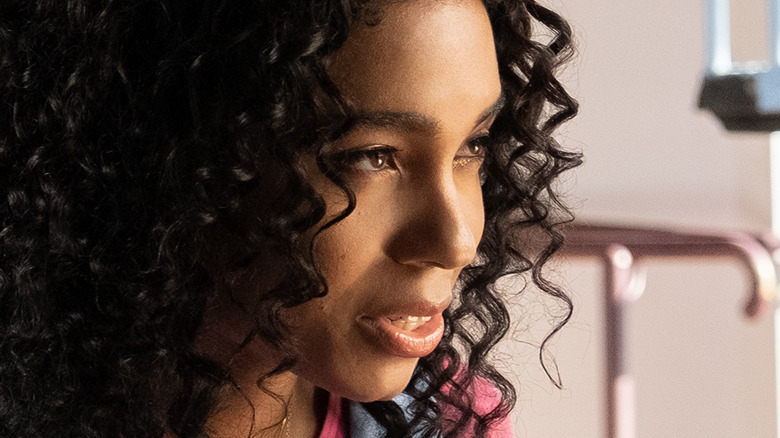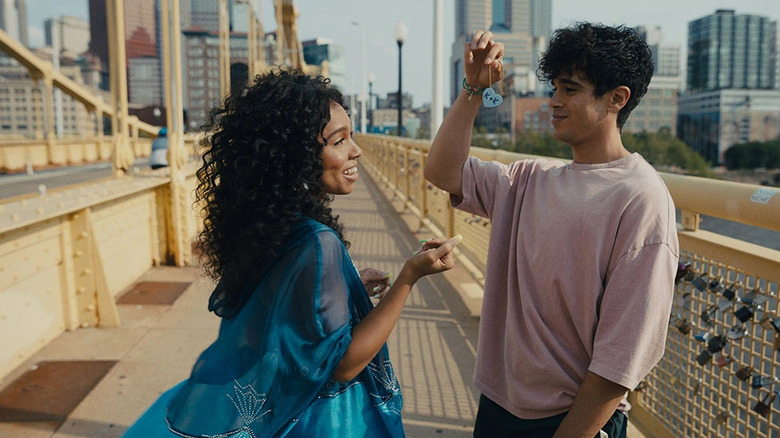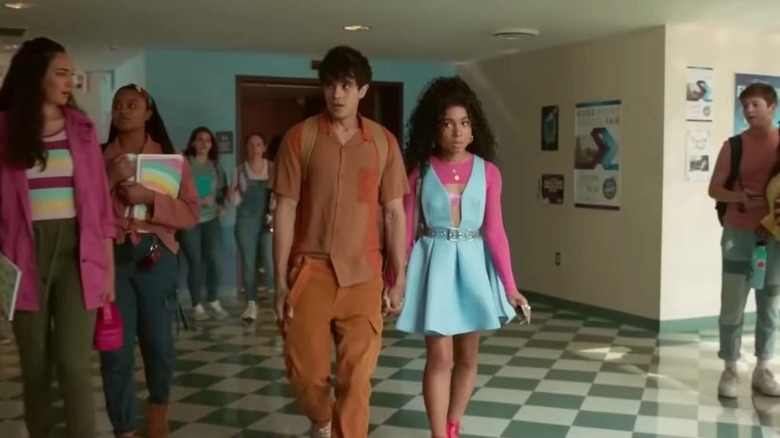Anything's Possible Review: A Vital, But Average, Teen Drama
- A wonderfully realized central character study
- The romance never quite takes off - the focus is so squarely on the couple's conflict, that it never emotionally hits in the way it should
Billy Porter hasn't always hit the mark when discussing issues of LGBTQ representation. Infamously, this peaked with his best actor win at the Emmys for his performance as ballroom MC Pray Tell in the remarkable series "Pose," breaking down barriers as the first openly gay Black man to win the accolade. Almost immediately afterward, though, goodwill quickly dried up as he mangled the answer to a journalist's question about his response to his trans-co-stars not receiving acting nominations — telling the reporter that they'd "get their shot" with upcoming seasons and that the real win for them was the show being nominated in the first place.
Porter himself may be breaking down barriers in his career, but his attempts to reflect on that success and what that means within the pop culture landscape overall are notoriously clumsy, even if you can see the positive intentions behind them. That is similarly reflected in his directorial debut "Anything's Possible," a surprisingly low-key teen romance he reportedly signed on to make 30 pages into reading the script, after realizing it was set in his hometown of Pittsburgh. The screenplay by Ximena García Lecuona, which appeared on the 2020 Black List of best-unproduced scripts in Hollywood, often hews far closer to mumblecore than you'd expect, something that it's almost surprising has remained intact when adapted by the flamboyant star.
It feels authentic in its depiction of two teens awkwardly navigating their first relationship, but this proves to be something of a crutch for Porter, who keeps trying to amp up the melodramatic tension wherever possible; his lack of restraint eventually diverts the drama from a likable, if familiar, LGBTQ coming of age tale into a misguided attempt at self-promotion by its close.
The most average film to ever feel vital
Eva Reign stars as Kelsa, a teen vlogger counting down her final days of high school before she leaves her hometown of Pittsburgh behind for either New York or Los Angeles — somewhere nobody will know her. She's never considered dating out of an assumption her trans identity would become an issue for any would-be suitor, but that all changes when she meets Khal (Abubakr Ali), who is immediately smitten with her. He has no doubts, but becomes concerned about what the wider world will think about him dating a trans girl; it largely doesn't mind, but as their romance blossoms further, several self-inflicted obstacles come up along the way.
In a just world, there would be nothing noteworthy about "Anything's Possible" — that a film so stylistically uneven needs to be championed to any extent is a result of the increasing hostility towards trans people (and in particular, young trans people) which is becoming uncomfortably normalized in the mainstream. Here is a decidedly unremarkable teen drama that has the misfortune of releasing at a time when young queer people are being targeted via prejudiced laws in several states, meaning the sheer openness the film has in embracing its lead character's identity gives it a vitality it wouldn't have in any other circumstance. It's a film that young LGBTQ audiences desperately need to exist within the mainstream right now, meaning critiquing its flaws feels almost irrelevant, even if they are hard to overlook from a filmmaking perspective.
There are some places in which Lecuona's screenplay feels a little outdated, not least the less-than-assured way in which the film explores Khal's initial anxieties surrounding dating a trans woman. These don't seem to be rooted in realistic teen concerns about what his peers think, so much as they feel like they're unnecessarily educating an audience it assumes are more conservative than they likely will be (make no mistake: we've depressingly arrived at a point where no piece of media can bridge societal divides). The screenwriter was inspired to write the film after seeing a Reddit post similar to Khal's, feeling heartened as a trans woman to see so many people were supportive of a cis guy asking his trans crush out, but it, unfortunately, dwells on the cis love interest's own hang-ups for too much of the drama. For a romance film, the central couple spends significantly more time apart than they do together, the film's climax not hitting quite the right note because of it.
An interesting character study, trapped in a less assured romance
The writing for Kelsa feels considerably more assured in and of itself, especially as it explores her own internal conflict about whether she wants to be seen as trans by a world likely to "other" her, without diminishing pride in her own identity. Lecuona wanted to write a screenplay that captured trans joy, in order to give trans teens the big screen romance they've never been afforded within mainstream cinema — and yet, her screenplay brings conflict into that partnership for the bulk of the running time, things smoothing over largely through a third act montage, a relationship we're told becomes powerful through telling, not properly showing. The conflicts within the relationship become so numerous, that it's impossible to swoon along with them by the finale, or become affected by the melancholy ending as the pair start their new lives in college. As a character study for its female romantic lead, it is far more effective, a classic high school drama about the final months in your hometown, coming to terms with how it has shaped you before you leave it and reinvent yourself.
As melodramatic as some of the film does become, there are several moments that do feel vital. A second act plot development sees a bathroom ban become central to the drama. Smartly, the film isn't about the wider political implications of this; after all, if you're watching "Anything's Possible," you're going to be on the side of trans people in this situation. Instead, it's a far more interesting exploration of being forced into a wider conversation you don't want to be a part of, and the irritation of your existence being reduced to a political argument. Kelsa's annoyance at her many cis friends and allies throwing a rally in school in support of her is a particularly striking moment — there's believable anger at how she's being spoken about but never spoken to when it comes to the basic issues of her existence.
The screenwriter has said Porter gave her more creative control than you'd usually expect from a director/screenwriter collaboration, receiving final script approval, and the assurance he wouldn't transform any aspects of her screenplay without her consent. He stops short of a director cameo, but does insert a sequence of the two leads visiting a mural of him in downtown Pittsburgh, and ends the film with the entire cast dancing to one of his original songs over the end credits — a film designed to celebrate trans joy, where Porter has ensured he is the one responsible for making it possible. The film's intentions are unquestionably positive, but there's a typically Porter-esque clumsiness in how he still manages to center himself when the focus should squarely be on the other LGBTQ people in the picture.
For teenage audiences, "Anything's Possible" comes highly recommended as a sweet-natured romance that captures a trans coming of age experience very rarely captured in mainstream cinema. But for anybody older, there's not as much interest — you'll agree the film's existence is vital in the current climate while struggling to look past its various issues as a piece of filmmaking.


